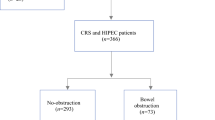Abstract
Background
Patients with peritoneal metastases from appendiceal cancer are at high risk of malignant bowel obstruction (MBO), which is associated with significant morbidity and mortality. There are no definitive treatment guidelines regarding operative intervention for MBO. We sought to evaluate the efficacy and safety of operative intervention in this population.
Methods
We identified patients with peritoneal metastases from appendiceal cancer who underwent surgery for MBO at our institution between 2011 and 2018. Baseline characteristics, postoperative complications, and follow-up data were collected. The primary endpoint was obstruction-free survival (OFS). Other endpoints were postoperative recovery of bowel function, 60-day Clavien–Dindo (CD) morbidity, and overall survival (OS).
Results
Twenty-six patients underwent operative treatment for MBO, of whom 14 had high-grade (HG) histology and 12 had low-grade (LG) histology. Seven (25.9%) patients had severe (CD grade 3 or higher) 60-day complications, including one (3.8%) postoperative death. All remaining patients had return of bowel function and resumed oral intake during hospitalization. Six (23.1%) patients had repeat admissions for MBO after surgery. Median OFS was 17.0 months (95% confidence interval [CI] 2.3–31.8), and median OS was 18.5 months (95% CI 3.6–33.3) following surgery.
Conclusion
In this carefully selected group of patients with peritoneal metastases from appendiceal cancer, surgery for MBO provided durable palliation with acceptable morbidity.


Similar content being viewed by others
References
Chakraborty A, Selby D, Gardiner K, Myers J, Moravan V, Wright F. Malignant bowel obstruction: natural history of a heterogeneous patient population followed prospectively over two years. J Pain Symptom Manag. 2011;41(2):412–420.
Feuer DJ, Broadley KE, Shepherd JH, Barton DP. Surgery for the resolution of symptoms in malignant bowel obstruction in advanced gynaecological and gastrointestinal cancer. Cochrane Database Syst Rev. 2000;(4):CD002764.
Francescutti V, Miller A, Satchidanand Y, Alvarez-Perez A, Dunn KB. Management of bowel obstruction in patients with stage IV cancer: predictors of outcome after surgery. Ann Surg Oncol. 2013;20(3):707–714.
Wong TH, Tan YM. Surgery for the palliation of intestinal obstruction in advanced abdominal malignancy. Singap Med J. 2009;50(12):1139–1144.
Henry JC, Pouly S, Sullivan R, et al. A scoring system for the prognosis and treatment of malignant bowel obstruction. Surgery. 2012;152(4):747–756; discussion 756–747.
Hwang M, Pirrello R, Pu M, Messer K, Roeland E. Octreotide prescribing patterns in the palliation of symptomatic inoperable malignant bowel obstruction patients at a single US academic hospital. Support Care Cancer. 2013;21(10):2817–2824.
Soriano A, Davis MP. Malignant bowel obstruction: individualized treatment near the end of life. Cleve Clin J Med. 2011;78(3):197–206.
Dolan EA. Malignant bowel obstruction: a review of current treatment strategies. Am J Hosp Palliat Care. 2011;28(8):576–582.
Roeland EJ. Managing malignant bowel obstruction: moving beyond drip and suck. J Oncol Pract. 2017;13(7):437–438.
Pujara D, Chiang YJ, Cormier JN, Bruera E, Badgwell B. Selective approach for patients with advanced malignancy and gastrointestinal obstruction. J Am Coll Surg. 2017;225(1):53–59.
Paul Olson TJ, Pinkerton C, Brasel KJ, Schwarze ML. Palliative surgery for malignant bowel obstruction from carcinomatosis: a systematic review. JAMA Surg. 2014;149(4):383–392.
White SI, Abdool SI, Frenkiel B, Braun WV. Management of malignant left-sided large bowel obstruction: a comparison between colonic stents and surgery. ANZ J Surg. 2011;81(4):257–260.
Santangelo ML, Grifasi C, Criscitiello C, et al. Bowel obstruction and peritoneal carcinomatosis in the elderly. A systematic review. Aging Clin Exp Res. 2017;29 Suppl 1:73–78.
Shaib WL, Goodman M, Chen Z, et al. Incidence and survival of appendiceal mucinous neoplasms: a SEER analysis. Am J Clin Oncol. 2017;40(6):569–573.
Ihemelandu C, Fernandez S, Sugarbaker PH. A prognostic model for predicting overall survival in patients with peritoneal surface malignancy of an appendiceal origin treated with cytoreductive surgery and hyperthermic intraperitoneal chemotherapy. Ann Surg Oncol. 2017;24(8):2266–2272.
World Health Organization Classification of Tumours of the Digestive Tract. Vol 3. 4th ed. Lyon: IARC Press; 2010
Carr NJ, Cecil TD, Mohamed F, et al. A consensus for classification and pathologic reporting of pseudomyxoma peritonei and associated appendiceal Neoplasia: the results of the Peritoneal Surface Oncology Group International (PSOGI) modified delphi process. Am J Surg Pathol. 2016;40(1):14–26.
Dindo D, Demartines N, Clavien PA. Classification of surgical complications: a new proposal with evaluation in a cohort of 6336 patients and results of a survey. Ann Surg. 2004;240(2):205–213.
Folkert IW, Roses RE. Value in palliative cancer surgery: a critical assessment. J Surg Oncol. 2016;114(3):311–315.
Asare EA, Compton CC, Hanna NN, et al. The impact of stage, grade, and mucinous histology on the efficacy of systemic chemotherapy in adenocarcinomas of the appendix: analysis of the national cancer data base. Cancer. 2016;122(2):213–221.
SWOG. SWOG Study S1316. Prospective comparative effectiveness trial for malignant bowel obstruction. 2017. Available at: http://swog.org/Visitors/S1316/.
Acknowledgment
This study was supported by a University of California San Diego Clinical and Translational Research Institute Grant (UL1TR001442).
Author information
Authors and Affiliations
Corresponding author
Ethics declarations
Disclosures
Joel M. Baumgartner, Rebecca Marmor, Athena Hsu, Jula Veerapong, Kaitlyn J. Kelly, and Andrew M. Lowy have no disclosures or relevant conflicts of interest to declare.
Additional information
Publisher's Note
Springer Nature remains neutral with regard to jurisdictional claims in published maps and institutional affiliations.
Rights and permissions
About this article
Cite this article
Baumgartner, J.M., Marmor, R., Hsu, A. et al. Obstruction-Free Survival Following Operative Intervention for Malignant Bowel Obstruction in Appendiceal Cancer. Ann Surg Oncol 26, 3611–3617 (2019). https://doi.org/10.1245/s10434-019-07507-4
Received:
Published:
Issue Date:
DOI: https://doi.org/10.1245/s10434-019-07507-4




